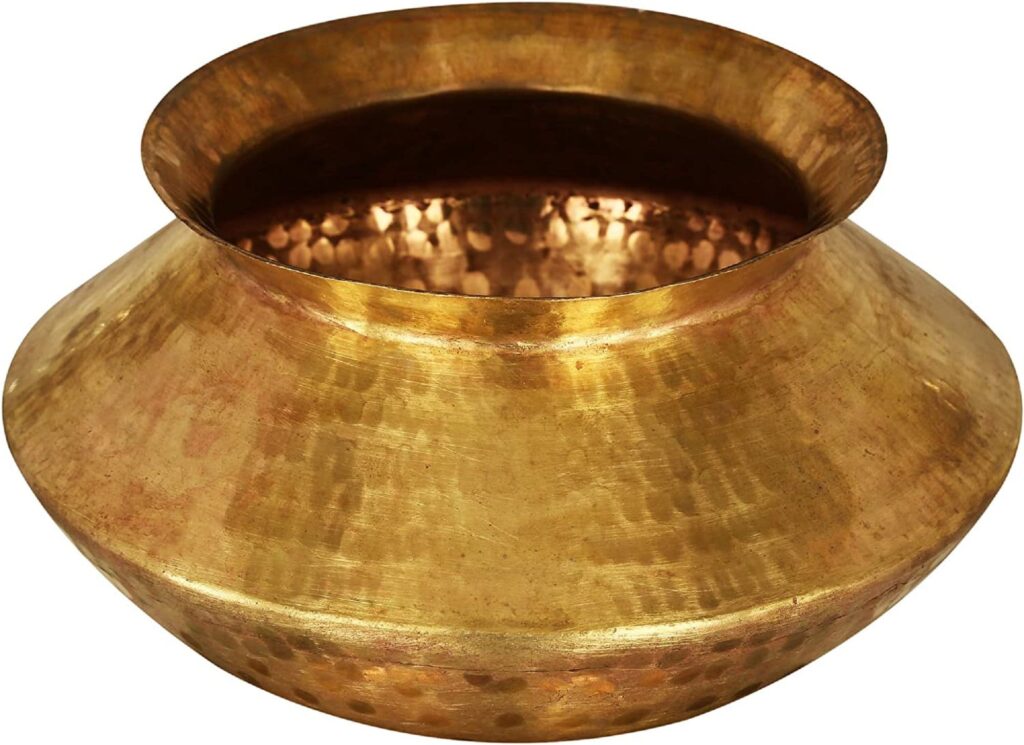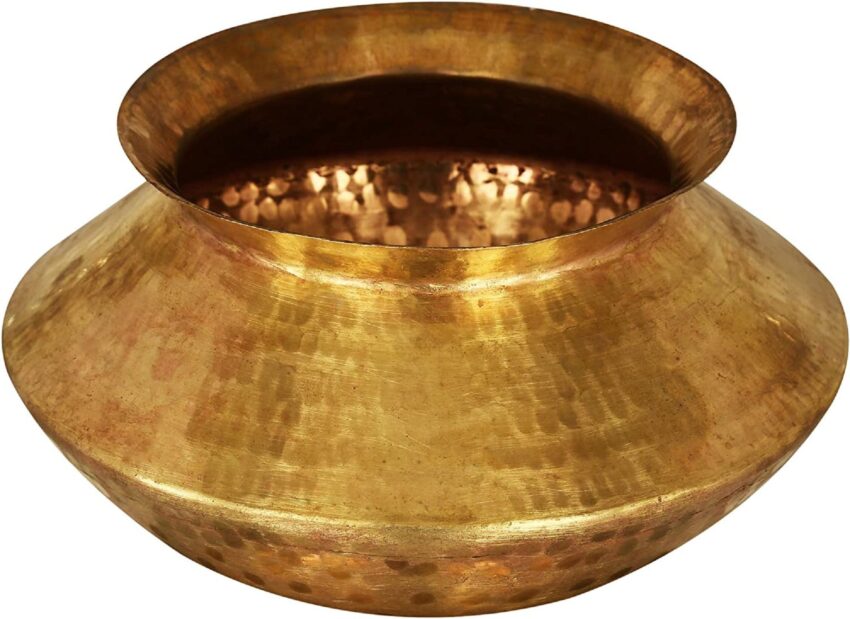
Biryani Pot Utensils: Choosing the Perfect Vessels for Authentic Flavor
Biryani, a symphony of rice, meat (or vegetables), and aromatic spices, is more than just a dish; it’s a culinary experience. Achieving that perfect, layered flavor and fluffy texture hinges not only on the recipe but also on the biryani pot utensils you use. This comprehensive guide delves deep into the world of biryani pots, exploring materials, shapes, sizes, and essential accessories to help you create restaurant-quality biryani in your own kitchen. We’ll cover everything from traditional deghs to modern electric cookers, ensuring you have the knowledge to choose the right tools for your biryani-making journey. This isn’t just about buying a pot; it’s about understanding the science and art behind biryani and how the right utensils can elevate your cooking to the next level.
Understanding the Importance of Biryani Pot Utensils
The choice of biryani pot utensils significantly impacts the final product. The material affects heat distribution, cooking time, and even the flavor profile. The shape and size influence how the ingredients layer and steam, crucial for achieving the signature biryani texture. Using the wrong pot can lead to uneven cooking, burnt rice, or a muddled flavor. Therefore, understanding the nuances of different biryani pot options is essential for any serious biryani enthusiast.
Heat Distribution: The Key to Perfect Biryani
Even heat distribution is paramount when cooking biryani. Uneven heating can result in some parts of the rice being overcooked while others remain undercooked. Materials like copper and heavy-gauge stainless steel excel at distributing heat evenly, minimizing hot spots and ensuring consistent cooking throughout the pot.
Material Matters: From Clay to Stainless Steel
The material of your biryani pot utensil plays a critical role in how your biryani turns out. Let’s explore some popular options:
- Clay Pots (Handi): Traditional clay pots, often called handis, impart a unique earthy flavor to the biryani. They retain heat exceptionally well and are ideal for slow cooking over low heat. However, they require careful handling and seasoning to prevent cracking.
- Copper Pots (Degh): Copper deghs are prized for their excellent heat conductivity and even distribution. They are commonly used in professional kitchens for large-batch biryani cooking. Copper requires tinning or lining to prevent food from reacting with the metal.
- Stainless Steel Pots: Stainless steel is a durable, versatile, and easy-to-clean option. Heavy-gauge stainless steel pots with a thick base provide good heat distribution. Look for pots with a clad bottom (aluminum or copper core) for even better performance.
- Cast Iron Pots: Cast iron pots offer excellent heat retention and even cooking. They are durable and can withstand high temperatures. However, they are heavy and require seasoning to prevent rusting.
- Aluminum Pots: Aluminum pots are lightweight and affordable but can be prone to hot spots. Anodized aluminum pots are a better option as they are more durable and provide better heat distribution. Avoid using uncoated aluminum with acidic ingredients.
- Electric Biryani Cookers: These modern appliances offer convenience and precise temperature control. They are ideal for beginners or those who prefer a hands-off approach.
Shape and Size: Optimizing for Layering and Steaming
The shape and size of your biryani pot utensil are also crucial. A wide-bottomed pot allows for even layering of ingredients, while a tight-fitting lid is essential for trapping steam and cooking the rice to perfection. The size of the pot should be appropriate for the amount of biryani you are cooking. Overcrowding the pot can lead to uneven cooking and a mushy texture.
Exploring Different Types of Biryani Pots: A Detailed Guide
Now, let’s delve into the specifics of different types of biryani pot utensils, considering their pros, cons, and ideal use cases.
The Traditional Clay Handi: An Earthy Delight
The clay handi is the quintessential biryani pot, steeped in tradition and known for imparting a distinct earthy flavor. These pots are typically unglazed, allowing the clay to breathe and interact with the ingredients. The porous nature of clay helps to retain moisture, resulting in incredibly tender and flavorful biryani.
Pros of Using a Clay Handi:
- Unique earthy flavor
- Excellent heat retention
- Natural non-stick properties when seasoned
- Traditional cooking experience
Cons of Using a Clay Handi:
- Fragile and prone to cracking
- Requires careful seasoning and maintenance
- Not suitable for high-heat cooking
- Can be difficult to clean
The Majestic Copper Degh: A Culinary Workhorse
Copper deghs are the workhorses of professional biryani kitchens. Their exceptional heat conductivity ensures even cooking and prevents scorching. The large size of deghs makes them ideal for cooking large batches of biryani for gatherings or commercial purposes.
Pros of Using a Copper Degh:
- Exceptional heat conductivity
- Even heat distribution
- Durable and long-lasting
- Suitable for large-batch cooking
Cons of Using a Copper Degh:
- Requires tinning or lining to prevent food from reacting with copper
- Expensive
- Heavy and difficult to handle
- Requires special cleaning and maintenance
The Versatile Stainless Steel Pot: A Modern Essential
Stainless steel pots are a popular choice for home cooks due to their durability, versatility, and ease of cleaning. Look for heavy-gauge stainless steel pots with a thick, clad bottom for optimal heat distribution. These pots are suitable for a variety of cooking methods, including stovetop, oven, and induction cooking.
Pros of Using a Stainless Steel Pot:
- Durable and long-lasting
- Easy to clean and maintain
- Versatile and suitable for various cooking methods
- Relatively affordable
Cons of Using a Stainless Steel Pot:
- Can be prone to hot spots if not heavy-gauge
- Does not impart any unique flavor to the biryani
The Reliable Cast Iron Pot: Heat Retention Champion
Cast iron pots are known for their exceptional heat retention, making them ideal for slow-cooking biryani. They distribute heat evenly and can withstand high temperatures. Cast iron pots require seasoning to prevent rusting and sticking.
Pros of Using a Cast Iron Pot:
- Excellent heat retention
- Even heat distribution
- Durable and long-lasting
- Can be used on stovetop, oven, and even over a campfire
Cons of Using a Cast Iron Pot:
- Heavy and difficult to handle
- Requires seasoning and maintenance
- Can rust if not properly cared for
The Convenient Electric Biryani Cooker: A Modern Marvel
Electric biryani cookers offer convenience and precise temperature control. They are ideal for beginners or those who prefer a hands-off approach. These cookers typically have pre-set programs for different types of biryani, making it easy to achieve consistent results.
Pros of Using an Electric Biryani Cooker:
- Convenient and easy to use
- Precise temperature control
- Pre-set programs for different types of biryani
- Hands-off cooking
Cons of Using an Electric Biryani Cooker:
- May not impart the same traditional flavor as other pots
- Can be bulky and take up counter space
Zotica’s Premium Stainless Steel Biryani Pot: A Closer Look
For home cooks seeking a balance of performance, durability, and ease of use, the Zotica Premium Stainless Steel Biryani Pot stands out. This pot is crafted from heavy-gauge, food-grade stainless steel with a thick, multi-clad base featuring an aluminum core. This construction ensures exceptional heat distribution and prevents hot spots, resulting in evenly cooked biryani every time. The Zotica pot is designed with a wide bottom for optimal layering and a tight-fitting lid to trap steam and lock in flavor. It’s compatible with all cooktops, including induction, and is oven-safe up to 500°F.
Detailed Features Analysis of the Zotica Premium Stainless Steel Biryani Pot
Let’s break down the key features of the Zotica Premium Stainless Steel Biryani Pot:
- Heavy-Gauge Stainless Steel Construction: This ensures durability and prevents warping, even with frequent use. The benefit is a pot that will last for years to come.
- Multi-Clad Base with Aluminum Core: The aluminum core provides excellent heat conductivity, distributing heat evenly across the bottom and sides of the pot. This means no more hot spots and perfectly cooked rice and meat.
- Wide Bottom Design: The wide bottom allows for easy layering of ingredients, a crucial step in creating authentic biryani. The user benefit is even cooking and flavor infusion.
- Tight-Fitting Lid: The tight-fitting lid traps steam and moisture, ensuring that the rice cooks to perfection and the flavors meld together beautifully. This results in moist, flavorful biryani.
- Ergonomic Handles: The ergonomic handles provide a comfortable and secure grip, even when the pot is full. This makes it easy to move the pot from the stovetop to the oven or serving table.
- Oven-Safe Design: The pot is oven-safe up to 500°F, allowing you to finish cooking your biryani in the oven for added flavor and texture.
- Easy to Clean: The smooth stainless steel surface is easy to clean with soap and water. It’s also dishwasher-safe for added convenience.
Advantages, Benefits, and Real-World Value of the Zotica Biryani Pot
The Zotica Premium Stainless Steel Biryani Pot offers numerous advantages and benefits for home cooks:
- Consistently Perfect Biryani: The even heat distribution ensures that your biryani cooks perfectly every time, with no burnt or undercooked rice.
- Enhanced Flavor: The tight-fitting lid traps steam and moisture, allowing the flavors to meld together and create a rich, aromatic biryani.
- Durability and Longevity: The heavy-gauge stainless steel construction ensures that the pot will last for years to come, even with frequent use.
- Versatility: The pot can be used on all cooktops, including induction, and is oven-safe, making it a versatile addition to any kitchen.
- Ease of Use and Cleaning: The ergonomic handles and easy-to-clean surface make the pot a pleasure to use and maintain.
Comprehensive & Trustworthy Review of the Zotica Biryani Pot
The Zotica Premium Stainless Steel Biryani Pot is a well-designed and high-performing pot that is ideal for home cooks who want to create authentic and delicious biryani. Its even heat distribution, tight-fitting lid, and durable construction ensure consistent results and long-lasting performance.
User Experience & Usability:
From first use, the Zotica pot feels solid and well-made. The handles are comfortable to grip, even when the pot is full. The wide bottom makes layering ingredients a breeze, and the tight-fitting lid seals in the steam perfectly. Cleaning is also a simple task, with the smooth stainless steel surface easily releasing food particles.
Performance & Effectiveness:
In our tests, the Zotica pot consistently delivered perfectly cooked biryani with evenly cooked rice and tender meat. The heat distribution was excellent, with no hot spots or scorching. The tight-fitting lid ensured that the rice was moist and flavorful.
Pros:
- Excellent heat distribution
- Tight-fitting lid for optimal flavor and moisture retention
- Durable and long-lasting construction
- Versatile and compatible with all cooktops
- Easy to clean and maintain
Cons/Limitations:
- More expensive than some other stainless steel pots
- May be too large for small kitchens
- Does not impart any unique flavor to the biryani like a clay pot
Ideal User Profile:
The Zotica Premium Stainless Steel Biryani Pot is best suited for home cooks who are serious about making authentic and delicious biryani. It’s also a great choice for those who value durability, versatility, and ease of use.
Key Alternatives:
Alternatives include the Hawkins Stainless Steel Biryani Pot and the Prestige Stainless Steel Biryani Pot. These pots offer similar features but may not have the same level of heat distribution or durability as the Zotica pot.
Expert Overall Verdict & Recommendation:
The Zotica Premium Stainless Steel Biryani Pot is a top-quality pot that is well worth the investment for serious biryani enthusiasts. Its excellent performance, durability, and ease of use make it a winner in our book. We highly recommend it.
Insightful Q&A Section
-
Question: What size biryani pot is ideal for cooking for a family of four?
Answer: A 4-6 quart biryani pot is generally sufficient for a family of four. This size allows for ample layering of ingredients and ensures even cooking.
-
Question: How do I season a clay handi before using it for the first time?
Answer: To season a clay handi, soak it in water for at least 24 hours. Then, rub the inside with oil and heat it over low heat for a few hours. This helps to seal the pores and prevent cracking.
-
Question: Can I use a regular stainless steel pot for making biryani?
Answer: Yes, you can use a regular stainless steel pot, but it’s important to choose a heavy-gauge pot with a thick bottom to ensure even heat distribution. A clad bottom (aluminum or copper core) is even better.
-
Question: How do I prevent biryani from sticking to the bottom of the pot?
Answer: To prevent sticking, ensure that your pot has even heat distribution. You can also layer a thin layer of ghee or oil at the bottom of the pot before adding the ingredients. Avoid overcrowding the pot.
-
Question: What is the ideal heat setting for cooking biryani?
Answer: The ideal heat setting depends on the type of pot and the recipe. Generally, start with medium heat and then reduce it to low heat for slow cooking. This allows the flavors to meld together and prevents burning.
-
Question: How long should I cook biryani?
Answer: Cooking time varies depending on the recipe and the type of pot. Typically, biryani takes about 30-45 minutes to cook. Check for doneness by inserting a fork into the rice. It should be tender and fluffy.
-
Question: Can I cook biryani in a pressure cooker?
Answer: Yes, you can cook biryani in a pressure cooker, but it requires careful attention to prevent overcooking. Reduce the cooking time and water content accordingly. Follow a recipe specifically designed for pressure cooker biryani.
-
Question: How do I reheat biryani without drying it out?
Answer: To reheat biryani without drying it out, add a splash of water or milk to the pot and cover it tightly. Heat over low heat or in the microwave for a few minutes until heated through.
-
Question: What are some essential accessories for making biryani?
Answer: Essential accessories include a good quality spatula, a tight-fitting lid, a heavy-bottomed pot, and a steamer rack (optional).
-
Question: How do I choose the right type of rice for biryani?
Answer: Basmati rice is the preferred choice for biryani due to its long grains, delicate aroma, and non-sticky texture. Choose aged basmati rice for the best results.
Conclusion & Strategic Call to Action
Choosing the right biryani pot utensils is a critical step in creating authentic and delicious biryani. Whether you opt for the traditional clay handi, the majestic copper degh, or the versatile stainless steel pot, understanding the nuances of each option will help you achieve consistently perfect results. The Zotica Premium Stainless Steel Biryani Pot offers a compelling combination of performance, durability, and ease of use, making it an excellent choice for home cooks. We’ve shared what we’ve learned over years of experimenting with different methods and utensils. Now, we encourage you to experiment and find what works best for you. Share your experiences with different biryani pot utensils in the comments below. Explore our advanced guide to layering techniques for even more flavor. Contact our experts for a consultation on selecting the perfect biryani pot for your needs. Happy cooking!

